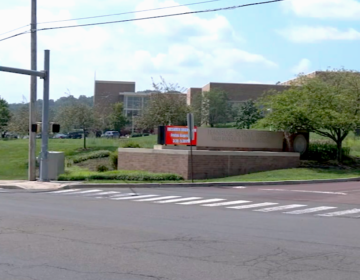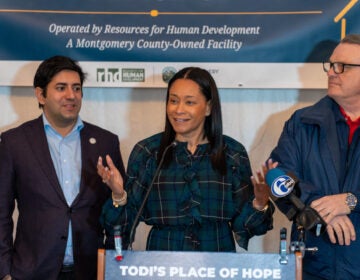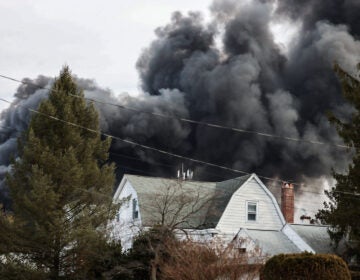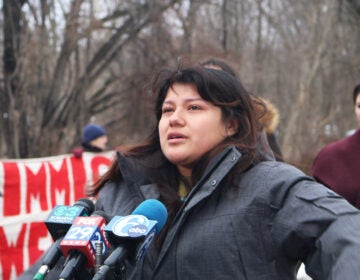Meet the teens behind a Montco Food Not Bombs group
They cook together every other Thursday, then set up a table in Norristown the following Saturday to distribute free meals and groceries.
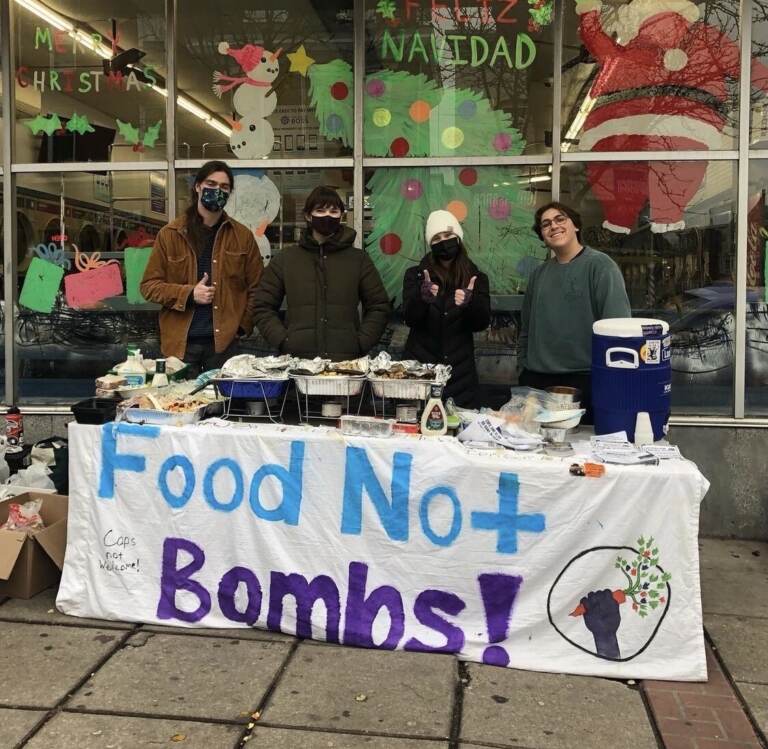
Montco FNB stationed in Norristown for one of their distributions. (Montco FNB)
What’s important for us to know about Philly’s suburbs?
Building community, distributing free meals, and connecting across town lines are the main priorities of Montgomery County’s new Food Not Bombs chapter.
This branch of the national anti-hunger group was created in April 2021 by a group of Upper Dublin High School students. It has about 15 active members, mostly teens from Upper Dublin.
They cook together every other Thursday afternoon, and then they set up a table in Norristown the following Saturday. They distribute free meals and groceries to about 30 people, on average.
Along with nutritious and appetizing hot vegetarian meals, they also have Narcan, hypodermic needles, feminine hygiene products, and warm clothes. While eating together, they talk to Norristown residents about their needs and the economic issues that connect their communities.
A 17-year-old senior at Upper Dublin High School was inspired to start the group after the 2020 protests responding to George Floyd’s murder at the hands of the police in Minneapolis. He said he started to learn about things such as gentrification and the “structural problems inherent to capitalism.”
The group’s main message: The money the United States spends on the military could instead feed the entire country. As members see it, part of the solution to hunger would be a change in the government’s priorities, from the federal to the local level.
“It’s pretty clear that the services in Norristown are lacking,” the teen said. “There’s still a lot of hunger there.”
The senior, who asked to remain anonymous, is critical of Montgomery County for investing in a new courthouse in Norristown. Meanwhile, Norristown is displacing the only 24/7 shelter in the county, Coordinated Homeless Outreach Center, or CHOC. A large population of people experiencing homelessness is already living in encampments in the area, and according to the county, the closing of CHOC without finding a new home for the shelter would create a bigger crisis.
“You can see their priorities right there,” said the 17-year-old. “They are more interested in making their courthouse nicer than helping people.”
The Food Not Bombs chapter functions with little to no cash and material donations. In an effort to reduce food waste, members initially asked a local grocery store if it could donate that food to them. They were denied.
The senior called that an example of a food system created not to serve everyone, but for corporations to earn a profit.
“Corporations go ahead and throw this food away in order to create something called ‘artificial scarcity,’” he said.
So the group’s members dumpster-dive from the grocery store to find usable food. They decided to take the food, to “take the action into our own hands.”
The Department of Agriculture reports that the United States wastes 30% to 40% of its food supply. About 30% of food waste comes from restaurants, groceries, and food service companies. According to the Environmental Protection Agency, food is the single largest category of material placed in municipal landfills, where it emits methane, a powerful greenhouse gas.
The Upper Dublin group has members with a wide range of political identities, from anarchists, Marxist-Leninists, and socialists, to Republicans. But they all agree on one thing: Food is a right, not a privilege, and also, “that we need to help each other,” said Matias Waschbusch, 15, the only member from Bucks County.
Waschbusch, who lives in New Hope, said that as he witnessed adults in his school district fight at school board meetings over masking policies this past year, he wished they also had a realignment of priorities.
“There’s people not even 40 minutes away from me not having money to get through a day,” said Waschbusch. “I think there are so many problems people focus on instead of what’s actually happening around us.”
Group members emphasized its many differences compared to a charity. It’s a mutual aid organization, which to them has an impact on how they distribute goods and how they run the group.
Another Upper Dublin High School student, who asked to remain anonymous, said part of that is about spending time with community members, building relationships, and igniting real conversations about their needs.
“We, a lot of the time, eat our own food. We’ll enjoy it with the people that are also enjoying it,” she said. “You can’t really replace that human interaction of sharing a hot meal with people in your community with just grabbing a bagged sandwich. It’s a different type of environment that we create, and that’s one of the reasons we call it a food distribution instead of a food serving.”
The group’s founder said it’s also about its structure. Those who cook the food, the workers, are making the decisions for the organization. The Food Not Bombs group is non-hierarchical; it makes decisions based on group consensus, rather than a top-down approach.
Anyone who shows up to cook can cook whatever that person wants. They get to experiment. There aren’t leaders directing people with recipes.
“We don’t believe that you have to have some type of power and authority to help serve your community,” said one student.

The group says the whole process for them is fun, and that’s intentional. The moments of joy and simultaneous resisting of hierarchical systems, that’s also how the group’s founder views anarchism.
“We’re not just trying to envision a future world and move towards that. We’re trying to create anarchy for ourselves right now,” said its founder.
Montgomery County Food Not Bombs blatantly challenges authority.
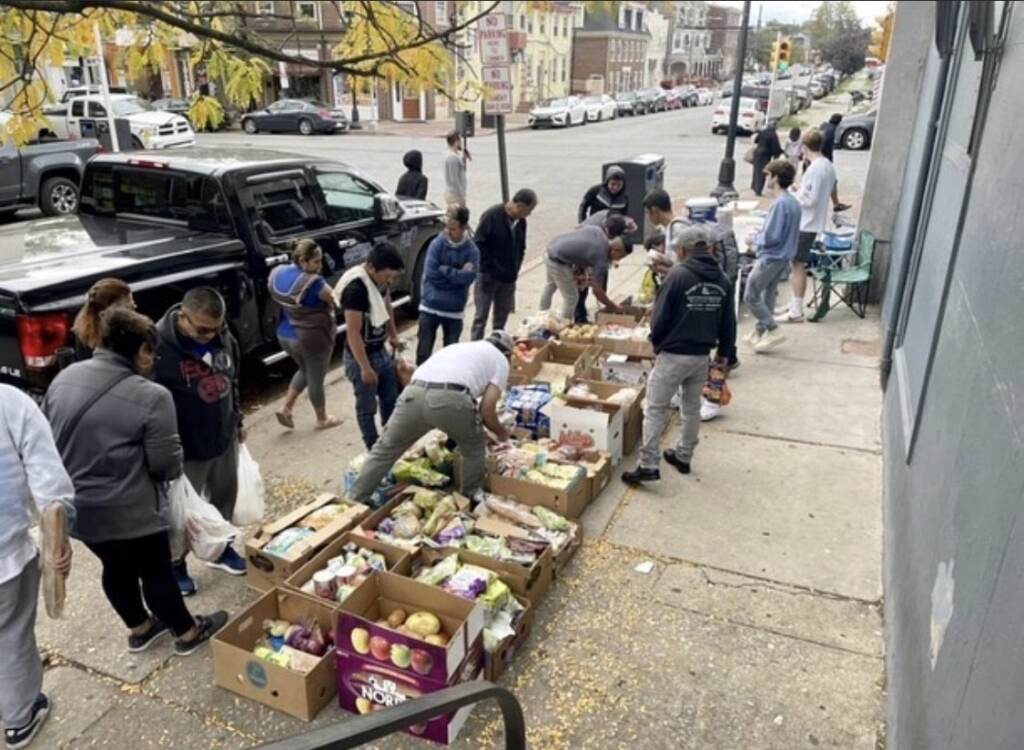
Last Monday, the group’s members sold bagels in their high school to raise money for Ukrainian people who are protesting war and a Ukrainian refugee organization. So far, they have raised $90.
After their first fundraiser, one member says she was called down to the principal’s office. She said that, according to the principal, they couldn’t sell food 30 minutes before the cafeteria sells breakfast, and that they would have to go through an established school club to sell food.
“Having a group doing something that’s against the rules of the administration challenges the legitimacy of their authority,” said its founder.
They originally chose not to make a club through the school, to avoid institutions influencing how they make decisions. They plan to keep it that way.
The teens hope to grow the organization, and share their knowledge with younger students before they graduate. They want their community to see the importance of organizing as if every day is a crisis, not just when a tornado hits.
“I think it’s a crisis that so many people go hungry every day when we have enough food,” said one member. “It’s a crisis that so many people are are bombed every day by our government. It’s a crisis that people’s wages are stolen from them.”

Saturdays just got more interesting.
WHYY is your source for fact-based, in-depth journalism and information. As a nonprofit organization, we rely on financial support from readers like you. Please give today.


